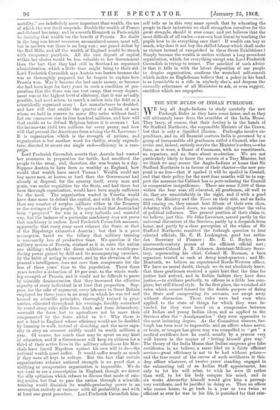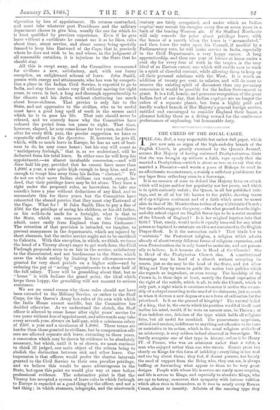THE NEW RULES OF INDIAN FURLOUGH.
I/VE beg all Anglo-Indians to study carefully the new
Furlough Rules as they have come home, and as they will ultimately issue from the crucibles of the India House. They fancy, of course, that their destiny is in the hands of Sir Stafford Northcote, the responsible Minister of the Crown, but that is only a dignified illusion. Furloughs involve ex- penditure, and on all financial matters India is governed by a group of irresponsible old gentlemen called a Council, who can revise and, indeed, entirely rewrite the Minister's orders,—who form, as it were, a House of Commons, with no constituents, no reporters, and no fears about re-election. We are not particularly likely to know the secrets of a Tory Minister, but we think we may assure the Anglo-Indians at home that Sir Stafford Northcote is in favour of their charter—the new pro- posal is no less—that if spoiled it will be spoiled in Council, and that their policy for the next four months will be to sup- port the measure the Cabinet has in petto reducing the Council to comparative insignificance. There are some 2,500 of them within the four seas, all educated, all gentlemen, all well to do, they are unmistakably in the right, and if with a good cause, the Ministry and the Times on their side, and an India Bill coming on, they cannot beat fifteen of their own class, debating with closed doors, we mistake altogether the value of political influence. The present position of their claim is, we believe, just this. Sir John Lawrence, moved partly by the universal discontent of the Services, partly by a despatch from home, and partly by a clear perception of the wishes of Sir Stafford Northcote, remitted the furlough question to four selected officials, Mr. E. H. Lushington, good but ortho- dox Secretary of Finince ; Mr. E. C. Bayley, keen nineteenth-century person of the efficient official sort ; Lieutenant-Colonel A. B. Johnson, Assistant-Military Secre- tary, representing his chief, Colonel H. Norman, a born organizer, trusted as such at Army head-quarters ; and Mr. Monteath, we believe an experienced North-Western officer. We have no moral doubt, though we do not absolutely know, that these gentlemen received a quiet hint that the time for justice had arrived, and in Indian fashion they have done justice,—to civilians perfectly, to officers in a little less com- plete, but still liberal style. In the first place, the wretched old rules, which seemed framed for the double purpose of fining the State and exasperating its servants, are swept away without discussion. Those rules were bad even when applied to the state of things for which they were in- tended, for they were based on a compromise between old Indian and young Indian ideas, and as applied to the Services after the " Amalgamation " they were oppressive to the most irritating degree. As the Committee observe, fur- lough has been next to impossible, and an officer whose nerve, or brain, or temper has given way was compelled to "get " a medical certificate how he could, usually by a process very well known in the tropics of " letting himself give way." The theory of the India House that Indian surgeons give false certificates is, we believe, a mere libel on a fairly efficient service—great efficiency is not to he had without prizes— and the true secret of the excess of such certificates is this. Any officer whatever, of twelve years' standing, engaged in the exhausting toil of an Indian Staff appointment, has only to let his will relax, to wish he were ill rather than well, to let his body conquer his mind, and in six weeks Abernethy himself would give him a peremp- tory certificate, and be justified in doing so. Then an officer who comes home, to go back in a year or two twice as efficient as ever he was in his life, is punished for that rein- vigoration by loss of appointment. He returns unattached, and must take whatever post Providence and the military department choose to give him, usually the one for which he is least qualified by previous experience. Even if he gets leave without a certificate he cannot use it as he likes, rules about time, about service, and about money being specially framed to keep him Eastward of the Cape, that is, precisely where he does not wish to be, and where, in the judgment of all reasonable outsiders, it is injurious to the State that he should stay.
All this is swept away, and the Committee recommend for civilians a new, satisfactory, and, with one funny exception, an enlightened scheme of leave. John Smith, person with energy and attainments, who has won by competi- tion a place in the Indian Civil Service, is expected to go to India, and stay there unless very ill without moving for eight years, to serve, in fact, a long and thorough apprenticeship to the climate and his duties, without chattering too much about home-sickness. That proviso is only fair to the State, and not oppressive to the civilian, who to be useful must have a good long spell of work in the scenes amid which he is to pass his life. That rule should never be relaxed, and we scarcely know why the Committee have reduced the period from ten years to eight. That time, however, elapsed, he may come home for two years, and there- after for every fifth year, the precise suggestion we have so repeatedly offered in the Spectator. If, however, he gets ill, which, with so much leave in Europe, he has no sort of busi- ness to do, he may come home ; but his stay will count as " anticipatory furlough," that is, as we understand, will be deducted from his total leave. In either case he will keep his appointment,—an almost invaluable concession,—and will draw half his pay, provided that he cannot have more than 1,2001. a year, a rate quite high enough to keep him, and not enough to tempt him away from his Indian " abstract." We do not see what more Indian civilians can want, except, in- deed, that their privilege leave may be let alone. They have a right under the proposed rules, as heretofore, to take one month's leave a .year without deductions of any kind, and to accumulate this for three years, but the Committee have reinserted the absurd proviso that they must stay Eastward of the Cape. What for ? If John Smith likes to pay a fine of 250/. for the privilege of seeing his children, or his old father, or his well-to-do uncle for a fortnight, what is that to the State, which can summon him, as the Committee admit, more easily from England than from Cashmere ? The retention of that provision is intended, we imagine, to prevent annoyances in the departments, which are injured by short absences, but the entire service ought not to be sacrificed to Calcutta. With this exception, in which, we think, we trace the hand of a Viceroy always eager to get work done, the Civil Furlough proposals seem to us fair to the service, satisfactory to the discontented, and not burdensome to the State, which saves the whole outlay by limiting leave allowances—now granted for very short periods on a higher scale—and by reducing the pay of "acting " appointments to a clear half of the full salary. There will be grumbling about that., but as "home " is with Indians the grand point, the ideal which keeps them happy, the grumbling will not amount to serious resistance.
We see no sound reason why these rules should not have been extended to the Military Service, or rather to the Staff Corps, for the Queen's Army has rules of its own with which the India House cannot meddle, but the Committee has decided otherwise. As we understand the sketch, the Staff officer is allowed to come home after eight years' service for two years without loss of appointment, and afterwards may take every seventh year, always on half-pay, with a minimum salary of 250/. a year and a maximum of 1,200/. These terms are harder than those granted to civilians, but in compensation offi- cers are allowed separate sick leave, extending to three years, a concession which may be shown by evidence to be absolutely necessary, but which, until it is so shown, we must continue to think ill judged, one main object of the reform being to abolish the distinction between sick and other leave. Our impression is that officers would prefer the shorter intervals granted to the Civil Service to their own peculiar privilege, and we believe this would be more advantageous to the State, but upon this point we would give way at once before professional evidence. The substantive point is that the Viceroy has accepted a system of leave rules in which furlough to Europe is regarded as a good thing for the officer, and not a bad thing ; in which steamers, telegraphs, and the nineteenth
century are fairly recognized, and under which an Indian employe may recruit his energies every five or seven years in a bath of the bracing Western air. If Sir Stafford Northcote will only concede the point about privilege leave, with the bonus of a month when the leave is " accumulated," and then force the rules upon his Council, if needful by a Parliamentary vote, he will make service in India, especially in the Civil Departments, a very happy career. A long apprenticeship, and then one year of leisure at home under a cool sky for every four of work in the tropics, is the very ideal of an Eastern career, one which will enable men to work in a spirit of cheerful content, while allowing them to keep up all their personal relations with the West. It is worth an addition of twenty per cent. to salaries, and will do more to remove the existing spirit of discontent than any pecuniary concession it would be possible for the Indian Government to grant. It is a full, hearty, and generous recognition of the great Indian fact of our day, that Indian employes are no longer the rulers of a separate planet, but form a highly paid and hardly worked branch of Her Majesty's general foreign service, entitled and encouraged to consider England their home, a pleasant holiday there as a fitting reward for the continuous performance of uupleasing, but honourable duty.































 Previous page
Previous page